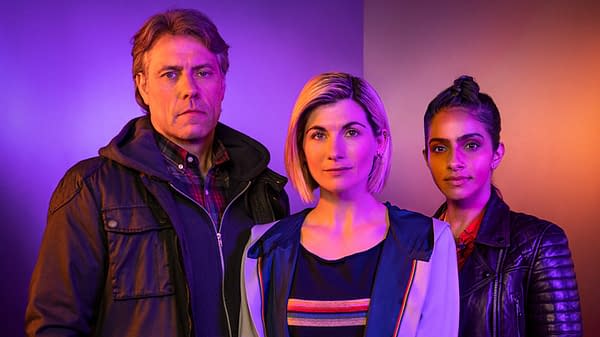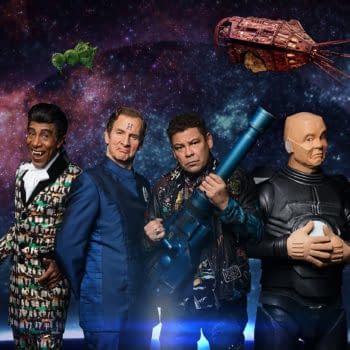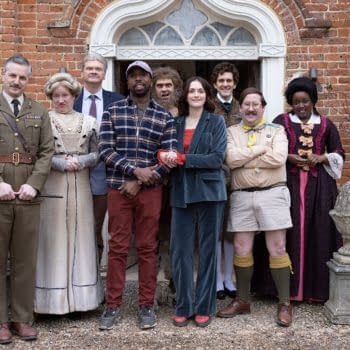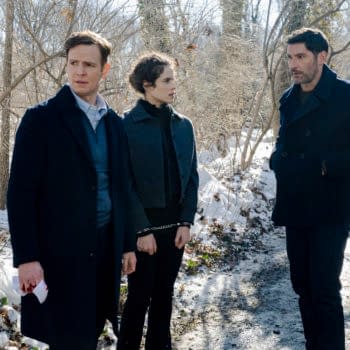Posted in: BBC, Doctor Who, TV | Tagged: bbc, chris chibnall, doctor who, jodie whittaker, Ncuti Gatwa, russell t davies, steven moffat
Doctor Who: Honoring What Worked During Chris Chibnall's Run
Chris Chibnall's tenure as showrunner on Doctor Who is coming to an end with the final 90-minute special "The Power of the Doctor," so it's time to look back. We know we've been down on Doctor Who: Flux. It's still terrible, and we don't take back what we wrote. Chibnall's flaws and limits as a screenwriter are well-known by now, but we should also talk about what he got right.

Chibnall Cast the First Female LGBTQ Doctor Who
Chibnall is the one who pulled the trigger and cast the first canonical female Doctor in Jodie Whittaker (Joanna Lumley in Steven Moffat's Children in Need spoof doesn't count, alas). At the launch of his time on Doctor Who, he also declared at New York Comic Con that "The Doctor is nonbinary," which officially put confirmed the Doctor as an LGBTQ character for the first time. Given that a large section of Doctor Who fandom has been LGBTQ for decades, that gave means a lot to them. To the children watching Doctor Who who don't really care about those issues, Whittaker has also been one of the most reassuring Doctors since she comes across as their favourite babysitter; her personality is that of the nice lady who teaches kindergarten and buys her organic muesli from the local co-op. Her interactions with kids in real life have been some of the highlights of her run.
Chibnall also then cast Jo Martin as the second female Doctor and the first person of colour to play the Doctor, essential a declaration that the floodgates were open and the Doctor can be played by literally anyone, not just white men. "Prisoner of the Judoon" was arguably Chibnall's best episode as a writer for Doctor Who – it was the best instance where his reliance on plot twists and surprises worked, throwing in first the return of fan favourite villains the Judoon and then the already-announced return of Captain Jack Harkness (John Barrowman) to hide the real twist: the introduction of a lost incarnation of the Doctor that Martin played. It paved the way for the public and fans to accept Ncuti Gatwa as the next Doctor when Russell T. Davies picked him. While pundits celebrate Gatwa as an LGBTQ Doctor of colour, Chibnall did it first with his two Doctors.
Chibnall also featured a heroic gay couple in one of his stories and didn't kill them. He also agreed to let #THASMIN happen where Yaz fell in love with the Doctor, who felt the same, even if it came perhaps too little, too late, but he did it.
Chibnall Told The Stories of Lesser-Known Historical Figures
Chibnall gave several new writers their first big break and commissioned stories that told the stories of unsung heroes like Rosa Parks (whose story is less well-known to British kids), the tragedy of the Partition of India into Pakistan, Ada Lovelace, Noor Inayat Khan, Nikola Tesla and his rivalry with Thomas Edison, and Mary Seacole, who was every bit as significant as Florence Nightingale but has been neglected by historians because she was back. Under his watch, Chibnall also oversaw stories where the Doctor had to contend with sexism when she was ignored by King James during the witchhunts and later had to put up with Lord Byron hitting on her, which was a witty commentary on sexism that male Doctors would not have encountered. Chibnall also had more female writers in his first two seasons than in any other previous seasons, and they often wrote the best episodes, which also featured the most insights into the personality of Whittaker's Doctor.
Chibnall's first two seasons were full of potential and promise. They just never quite reached the heights of previous seasons.
Chibnall Fought to Give Us Another Season of Doctor Who
When the Pandemic occurred and shut down the entire Film and Television Industry, Chibnall's third season of Doctor Who nearly got cancelled altogether. COVID safety rules made it too expensive and difficult to shoot many of the stories he was planning for the season, including major crowd scenes. He fought and came up with a shorter season, putting the cast and crew back to work. He salvaged the Sontaran story featuring Mary Seacole in the Crimean War to include in "Flux." We've talked about the problems in the writing of "Flux" – too much telling, not enough showing, etc. – but you might argue that some Doctor Who is better than no Doctor Who at all. He also gave us a new companion Dan Lewis, played by stand-up comedian John Bishop in a surprisingly soulful and poignant performance on top of being funny. There are casual viewers and fans alike who enjoyed "Flux," and in that respect, it was mission accomplished. We can argue about the problems with the scripts, but Chibnall was under enormous pressure to get the season produced and completed, and under COVID, it's something of a miracle he pulled it off, flaws and all.
So Chris Chibnall, we've given you plenty of shit during your run, but for what you accomplished, we salute you.
US viewers can reassess Chris Chibnall's run on Doctor Who on HBO Max.













